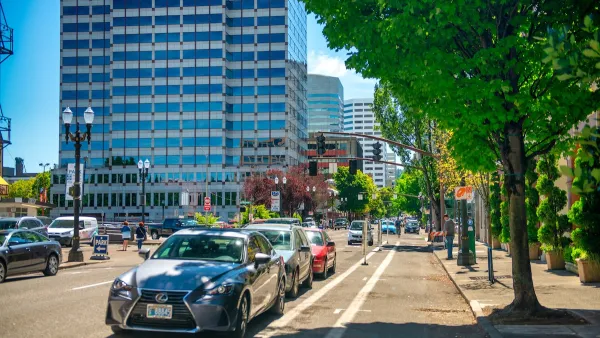A researcher in Pittsburgh could render obsolete the arduous task of manually inspecting streets for cracks and potholes.
Irena Zhorov reports on an ongoing project by Christoph Mertz, a researcher with Carnegie Mellon University, who has built a computer program that uses photos to detect cracks in pavement. The hope is that the new technology will help cities inspect and maintain streets more efficiently.
Mertz's program "uses photos from the cameras installed in city vehicles — vehicles that would be making rounds in the city anyway, not requiring dedicated city employees’ time. The program breaks the pavement in each picture into a grid and then the photos are combed digitally, using an algorithm, looking for texture. A newly paved road looks flat to the machine, but a road with cracks in it will have texture. Then it calculates how much of the given surface is covered by cracks and scores the road’s condition."
The article includes a lot more information about how the current practice of street maintenance compares to the potential of the program.
FULL STORY: New technology could help cities inspect and maintain streets more efficiently

Maui's Vacation Rental Debate Turns Ugly
Verbal attacks, misinformation campaigns and fistfights plague a high-stakes debate to convert thousands of vacation rentals into long-term housing.

Planetizen Federal Action Tracker
A weekly monitor of how Trump’s orders and actions are impacting planners and planning in America.

In Urban Planning, AI Prompting Could be the New Design Thinking
Creativity has long been key to great urban design. What if we see AI as our new creative partner?

King County Supportive Housing Program Offers Hope for Unhoused Residents
The county is taking a ‘Housing First’ approach that prioritizes getting people into housing, then offering wraparound supportive services.

Researchers Use AI to Get Clearer Picture of US Housing
Analysts are using artificial intelligence to supercharge their research by allowing them to comb through data faster. Though these AI tools can be error prone, they save time and housing researchers are optimistic about the future.

Making Shared Micromobility More Inclusive
Cities and shared mobility system operators can do more to include people with disabilities in planning and operations, per a new report.
Urban Design for Planners 1: Software Tools
This six-course series explores essential urban design concepts using open source software and equips planners with the tools they need to participate fully in the urban design process.
Planning for Universal Design
Learn the tools for implementing Universal Design in planning regulations.
planning NEXT
Appalachian Highlands Housing Partners
Mpact (founded as Rail~Volution)
City of Camden Redevelopment Agency
City of Astoria
City of Portland
City of Laramie





























